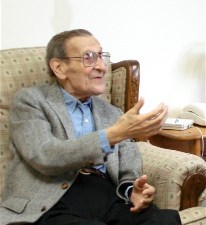I remember reading somewhere that people with Alzheimer's enjoy being with others like them. The following story illustrates that beautifully.
I'd just moved Ed, my Romanian soul mate of 30 years, into the Alois Alzheimer Center in Cincinnati, Ohio -- one of the best facilities anywhere for people with dementia. Initially, he'd been quite upset about the move, but as the days went by, much to my relief, he gradually forgot he'd even been moved at all.
When I went to visit one day I found him in his room looking at the newspaper, which he was holding upside down.
When he saw me he exclaimed, "Oh, Marie, I'm so happy to see you. You are so beautiful."
He folded the newspaper carefully and placed it just so in the top desk drawer. Then he walked over and sat down on the Early American sofa the Alois Center had provided until I could get his own furniture moved in the following week.
I sat down beside him, crossed my legs and propped my feet up on the coffee table. We discussed the horrible conditions in New Orleans, which he kept referring to as 'New Jersey,' after Katrina had hit just days before.
Suddenly, he changed the subject. And not only that, he changed world geography.
"It's wonderful that we're 'leeving' here in Bucha-r-r-rest," he said. "Don't you think so? I've 'leeved' here all my life. It's in the whole world one of the most beautiful cities."
I could tell that one of the many hallmark symptoms of Alzheimer's was alive and well that day. Although he likely couldn't remember what he had for breakfast that morning, his memories of living in Bucharest decades before seemed fairly intact.
But of course he didn't live in Bucharest anymore (he hadn't for 40 years), but nonetheless, I responded with the approach I'd been using for a long time, which was basically to agree with whatever he said in order to not upset him and to avoid a nasty argument.
"Uh-huh. Bucharest is certainly beautiful," I said, as convincingly as I could.
Suddenly, a stocky little man appeared in the doorway. His black trousers were hanging a couple of inches below his waist and his plaid burgundy and grey flannel shirt was un-tucked on the right side.
I was surprised when Ed, a life-long loner, smiled and reached out with his right arm, then smiled and shouted, "Come in, come in.'"
Ed looked at me and said, "Marie, this is my dear friend, John. We've been best friends for years."
John shuffled in, advancing in short jerky movements, his house-slippered feet barely lifting from the floor. Slightly balding, his remaining hair was jet black, his eyes dark brown, and he had a round, jovial face that reminded me of my Irish Grampa Graves.
"Yes, we've been best friends forever," John said, waving at us.
Ed patted the empty space next to him on the other side of the sofa and John sat down. Then -- and you might imagine my shock -- they started holding hands and taking turns telling me how many years they'd been best friends.
They reminded me of two little girls sitting on a bench, dangling their legs while waiting for the school bus. I was delighted -- though dazed -- that Ed had made a friend, and so quickly at that. Ed had never been one to make friends at all. And he'd only been at the Center a week.
They sat there sharing small talk and they continued holding hands. It was something we rarely, if ever, see in today's society. It made me feel a little uncomfortable, but it seemed perfectly natural for them.
"Hi, John," I said, wanting to be gracious to Ed's new friend. "How long have you lived here at the Alois Center?"
He snapped to attention. "All my life," he answered proudly.
I shouldn't have been surprised, but for some reason, I hadn't expected this man to be as confused as Ed.
After a while, John said he had to leave. After exchanging more pleasantries with Ed, he let go of Ed's hand and stood up. He bid farewell to his dear friend, then exited in the same shuffling gait with which he'd entered.
Despite my slight discomfort, the whole incident made me feel warm inside. And I knew then that I'd done the right thing by moving Ed into the Alois Center. It was obvious that he needed and enjoyed the company of other people -- something I never could have provided when he was living in his apartment. Before coming to the Center, Ed only interacted with me.
I peered out the door and watched as John inched down the hall and disappeared into another room, which I assumed was his own.
I found myself hoping he'd come back on a regular basis to visit Ed, his dear, affectionate "childhood friend."
Does anyone else out there have stories of how people with Alzheimer's can form deep bonds with each other?
Marie Marley is the award-winning author of the uplifting book, Come Back Early Today: A Memoir of Love, Alzheimer's and Joy. In addition, her website contains a wealth of information for Alzheimer's caregivers.
